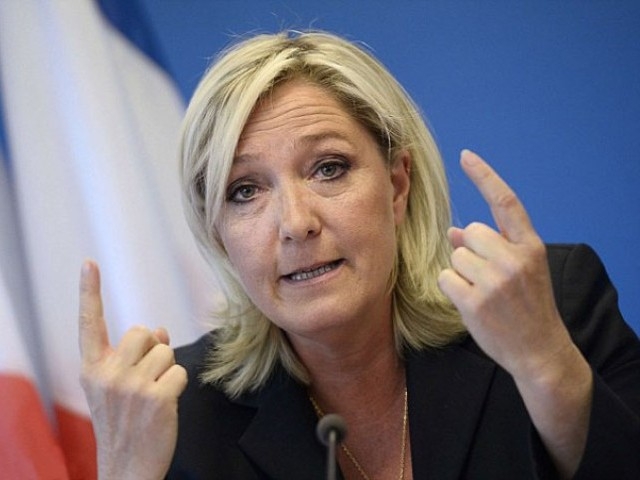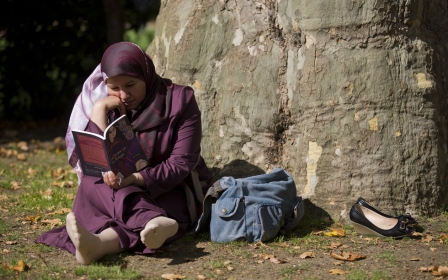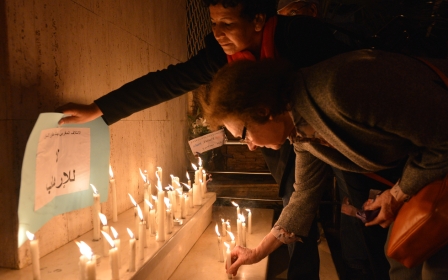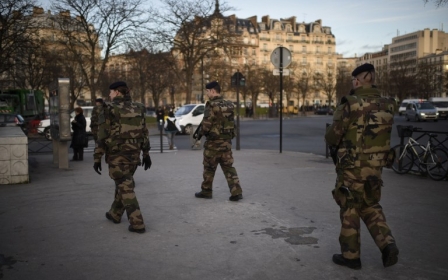The rise and rise of the National Front

Just a few hours after the attacks on Paris, the right-wing National Front (FN) leader Marine Le Pen declared: "France and the French are no longer secure, and it is my duty to tell you so."
Le Pen has since repeated her latest battle cry: France must immediately stop receiving migrants. The rhetoric has coincided with a surge in support - polling for local elections in December show that the FN leads in the Nord-Pas-de-Calais, northern France, and Provence-Alpes-Côte-d'Azur in the south.
Since taking over from her father Jean-Marie four years ago, the FN has worked hard to remove the anti-Semitic, racist views with which the party has been associated for decades. It has toned down the excesses of the past and repositioned as an "anti-system" party to widen its support base across the whole of French society.
Such has been its success that an FN association has been formed at that great bastion of the right-of-centre Republicans, the Paris Institute of Political Studies, a college that has produced many leading politicians and thinkers.
And the students who have signed up have "defected" from other parties: not only the right-wing, but also from the left. Those students, in their early 20s, all have the same reasons: their disappointment in the Republicans, formerly known as the UMP.
One student, 23-year-old Thomas, believes that the Republicans have abandoned all the values he cherished: secularism, equality, sovereignty.
The new recruits
The same feelings dog the left-wing. Antoine, a former Socialist party activist, points to his disappointment with the economic choices made by President Francois Hollande, although he voted for him in 2012.
He points out that Hollande last year sacked his anti-austerity economy minister Arnaud Monteburg. "I can no longer support a government that takes France downward," said Antoine.
For Davy, another former left-wing activist, it is the total "disconnection" between the Socialists and the concerns of the "real people" that finally made him decide to join the FN.
"We were going to campaign in tough areas, but with themes far away from people's concerns; we spoke of austerity... but we did not talk to them about their real concerns: insecurity, unemployment, immigration... and Europe."
According to Jean-Yves Camus, a political scientist and expert on far-right groups, the FN also offers the young a way into politics.
"Within an emerging party such as the FN, there are already career opportunities for young people in their early 20s. In the Ile-de-France regional election, a 20-year-old candidate ran for the FN," he said.
"In other parties, the apparatus is closed, the seats are expensive and the insider-culture is very strong."
What is striking about FN support is the spectrum of motivations: for some, it is the party's anti-European stance, for others, security.
It is as if the FN has developed a malleable ideology that allows everyone to find their place in the party. "You can enter the FN by sharing some of its values," says Jean-Yves Camus, "and not necessary all of them."
Anti-Semitic? Moi?
The FN, a far-right party whose former leader Jean Marie Le Pen was convicted for denying the Holocaust, has shown its ambition by seeking the support of the French Jewish community.
They have done so, however, by pointing the finger. In 2014, Marine Le Pen declared: "Our Jewish compatriots know that anti-Semitism is due to the introduction of Islamism in France."
Michel Thooris, a Jewish member of the FN's central committee, said: "Today, there is no doubt that many French Jews consider the FN to be credible - particularly on security issues, immigration and Islamism.
"The risk that Europe and France become Judenrein, without Jew, probably makes them aware of the need to vote for a patriotic political party that defends France, its sovereignty and identity.
Thooris also insists that his party is not anti-Muslim: "We defend secularism that specifically guarantees freedom of worship in France, including the Muslim religion."
"We do not base our policy on racial or religious discrimination. The national priority policy that we wish to implement is to give priority to French as opposed to foreigners, especially in employment, housing and health domains. This national priority policy is for all French, regardless of religious affiliation, skin colour or sexual orientation."
According to the IFOP institute, four per cent of Muslim voters supported Marine Le Pen in the last presidential election. Despite the low number, the party is emboldened and aware of growing support among Muslims - next month it will launch a new working group dedicated to the suburbs, whose slogan is "Muslims maybe, but French first".
Such ambition seeks to capitalise on a Muslim shift to the political right: opposition to same-sex marriage laws, opposition to Hollande's support of "the right of Israel to defend itself" during its war on Gaza last year, and perhaps, a form of fatigue with the ruling elites.
Mehdi, a French-Algerian bank executive, says he is tempted to vote for the FN in upcoming regional elections: "I grew up... with the idea that the FN was the big bad; but when I see the state of political debate in France... I say to myself that the FN is perhaps the least dangerous.
"I recognise myself in some of the FN issues such as security or sovereignty. Other parties lull us with promises but despise us at the end."
The fly in the ointment
But for Jean-Yves Camus, for a nationalist party that believes in no greater political power than the French state, Europe is its Achilles heel. For all its advances, what would happen if the FN came to power?
"What will we do then with the European question? If Le Pen wins in 2017... how could the FN stay in Europe without betraying its values?" says Camus. "Marine Le Pen could consult the French people directly through a referendum. But then what? Europe is the real challenge for the National Front."
The majority of French support the European Union. The question, therefore, is whether the rise of the FN, and its attempts to become a party of the French rather than a niche-nationalist grievance party, will have a short life span.
Emilia Denêtre is a French journalist based in Paris for eight years. A graduate of the Lille School of Journalism, Emilia worked with various Parisian media: Radio France, Europe1, Humanity Sunday, Novethic. Her fields of interest are French politics, societal debates, responsible economics and international relations.
This is an edited version of the original French article.
New MEE newsletter: Jerusalem Dispatch
Sign up to get the latest insights and analysis on Israel-Palestine, alongside Turkey Unpacked and other MEE newsletters
Middle East Eye delivers independent and unrivalled coverage and analysis of the Middle East, North Africa and beyond. To learn more about republishing this content and the associated fees, please fill out this form. More about MEE can be found here.




